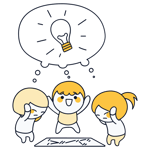Best Task Management Software: 11 Leading Tools Reviewed
How many tasks are scheduled this week? Do you know what they are? If you can't answer either question, a good task management platform might be just what you need. But with so many to choose from, which is the best?
We comprehensively tested 11 programs to show you which stand out for managing assignments and tasks.
Task Management vs. Project Management
Task management and project management are often used interchangeably. So, how do they differ?
Task management is all about assignments. It doesn't matter whether they're big, small, long, short, or part of a larger project.
Project management, on the other hand, focuses on entire projects. It helps to ensure they are completed within a set time frame and budget. Projects, in turn, are often made up of tasks.
There is overlap between the two and one doesn't necessarily exclude the other: Task management is always part of project management. Since the opposite isn't true, not every task management platform is well-suited for project management.
How Do Task Management Platforms Differ from Project Management Software?
Task management is part of project management. As a result, task management tools are less comprehensive than their project management counterparts. Look for these features when selecting a task management tool:
Easy task management
Creating, organizing, customizing, and visualizing any assignment should be as straightforward as possible.To-do lists
One of the best ways to visualize multiple tasks is with a to-do list. Check that the software you choose offers this capability.Custom fields
Since every assignment is different, your task management platform should allow custom properties, elements, and characteristics to be added to your tasks.Different views
Whether with a Kanban board, Calendar, Gantt, or Timeline view, assignments are often best displayed differently. The more options a platform offers, the more flexibly you can organize tasks.Subtasks
Tasks often consist of multiple stages or phases, which can be visualized and managed with subtasks. Check that your task management software allows subtasks to be configured like regular ones.Task dependencies
Some tasks stand alone, while others need to be completed in a specific sequence or order.
We expect all of the above features from a project management platform. These are usually more comprehensive and offer many more features for planning, executing, and monitoring complex projects.
Here are a few examples of features that are important for project management, but not task management:
Resource management
Many project management tools assist with allocating and monitoring project resources (such as personnel, equipment, or budgets).Project budgeting
Every project has a budget and project management tools often include financial planning features.Collaboration tools
Most project management platforms have integrated team communication and collaboration tools, like chats, forums, or shared document editing.Reporting and analytics
These features help to gather insights from project data and share them with stakeholders.
The 11 Best Task Management Tools
We thoroughly tested 11 project and task management tools. These were our favorites:
ClickUp: Endless Configuration Options

ClickUp* is a productivity platform boasting more than 8 million users. The self-described "One app to replace them all" embraces a more is better approach: None of the other providers from our sample offer anywhere near as many features.
What We Like
ClickUp is as flexible as its marketing claims: This doesn't just apply to features, but also settings and options. Just about every screen, view, or setting can be personalized or modified in one way or another.
We also liked ClickUp's structure: The platform follows a logical hierarchy in which projects and their tasks can be grouped and assigned differently. There are also plenty of views and visualization options, including filters.
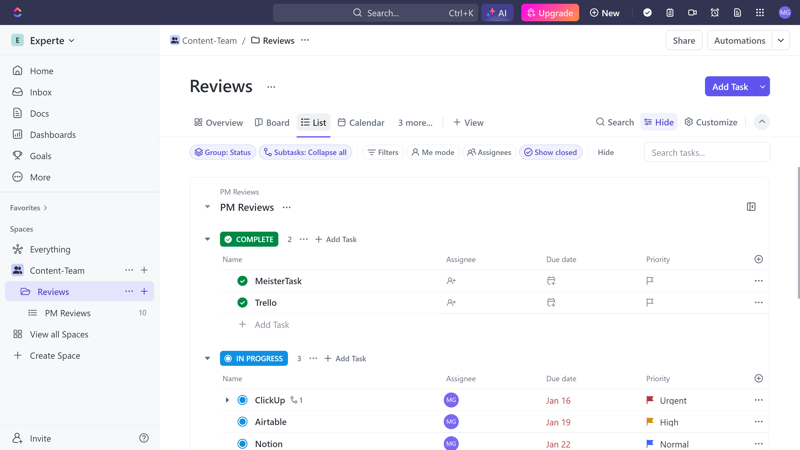
How Good Is ClickUp for Task Management?
With its focus on tasks, variety of editing options, and intuitive structure, ClickUp is perfectly suited for task management.
You'll be able to customize and arrange your tasks in different ways. ClickUp lets users configure projects and tasks to their liking. Beyond that, you can create subtasks and indicate dependencies between assignments.
What We Don't Like
For some, more isn't always better: Since ClickUp offers so much more than a task management platform, with even basic features having plenty of options and settings, certain users might feel overwhelmed.
If all you need is a straightforward to-do list or a streamlined platform for organizing assignments, ClickUp is overkill. The platform can be particularly confusing for beginners, and its interface has a tendency to freeze.
Asana: Task-Focused and Process-Driven Project Management

Asana* is a US project management tool developed by former Facebook staffers. Its goal is to reduce busy work by helping teams keep track of upcoming tasks, milestones, and goals.
What We Like
Asana actually makes working fun: Its streamlined and intuitive user interface is well-designed and provides everyone on the team with a hub for completing their assignments.
Beyond that, it offers a solid range of features, the most important views and task options, a user-friendly workflow builder for automations, and a nice selection of integrations.
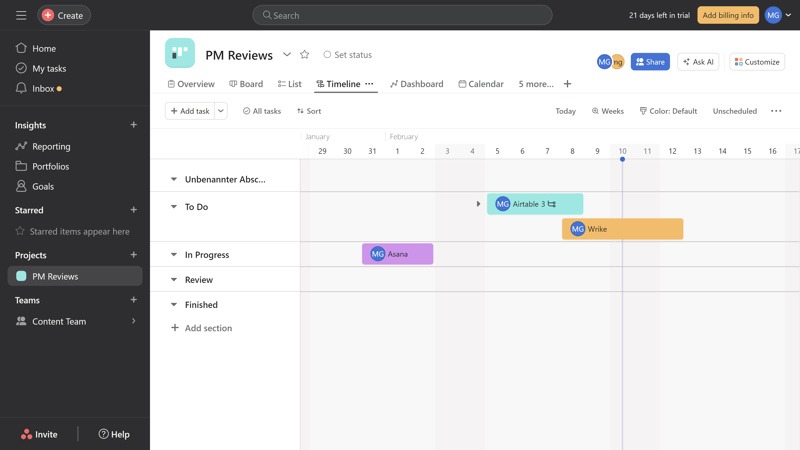
Asana is one of the most user-friendly project management platforms on the market.
How Good Is Asana for Task Management?
Asana is an excellent task management tool since it focuses on tasks and their progress. Creating and visualizing assignments is easy, regardless of whether they're independent or part of a more complex workflow.
Tasks can be further segmented into subtasks or contextualized by indicating dependencies between them. With the platform's powerful workflow builder, you can create custom rules and automations, saving time on routine tasks.
What We Don't Like
Asana isn't as flexible as other solutions when it comes to customizing assignments: It offers significantly fewer user-defined field types than ClickUp or monday.com.
In addition, with its emphasis on tasks and processes, Asana is better for daily task management than big-picture project planning. It does have goals and milestones, but data-driven project management platforms are more versatile.
monday.com: EXPERTE.com's Winner

monday.com* is a project management platform that wants to help effectively and efficiently plan and organize tasks. The software took first place in our comparison thanks to its solid combination of user-friendliness, features, and flexibility.
What We Like
Its elegant interface is user-friendly and intuitive, even for beginners. We're confident that team members of any experience level will quickly manage and work on their assignments.
monday.com is particularly good for managing complex projects with multiple tasks. It offers a central, data-driven overview of everything that can be visualized differently. As a result, monday.com makes life easier for project managers and team members.
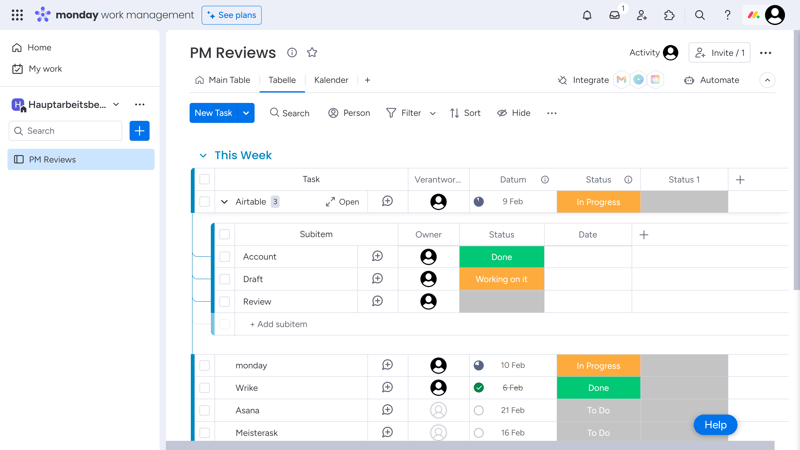
monday.com impresses with its intuitive interface that helps to clearly visualize comprehensive projects.
How Good Is monday.com for Task Management?
monday.com offers everything you'll need to manage assignments: You can customize your board's elements with a nice selection of user-defined fields, and shape workflows with subtasks, dependencies, and milestones.
In addition, monday.com provides nearly all important views, making it possible to visualize your tasks and projects from different perspectives. Onboarding new team members is a cinch too, thanks to its ease of use.
What We Don't Like
monday.com is less process and more data-driven than Asana: Tasks and their sequence are displayed less intuitively and not as streamlined as elsewhere.
There are also paywalls: Many useful features (integrations, automations, and time tracking) and views (Calendar, Timeline, or Gantt) are only offered to higher subscriber tiers. Unlocking these can make the software expensive.
In terms of collaboration tools, monday.com also isn't particularly well-equipped since it lacks chat and direct messaging features.
Notion: Notes and Tasks In One Place

Notion* is slightly out of place on this list: It isn't a task or project management tool, but a Wiki platform for notes and organizational databases. With that said, it's ideally suited for directing tasks and organizing projects.
What We Like
Notion is unbelievably versatile: The platform combines wiki functionality with project and task management features. As such, it can provide a hub for all project and organizational data, notes, and tasks.
Content is stored in customizable Notion pages that you'll design with seemingly endless templates and content blocks. This makes just about anything possible with Notion, including efficient task management.
Beyond that though, Notion also caught our eye with its competitive price-performance ratio and logical subscription packages that don't have license minimums. The latter makes it especially appealing for freelancers.
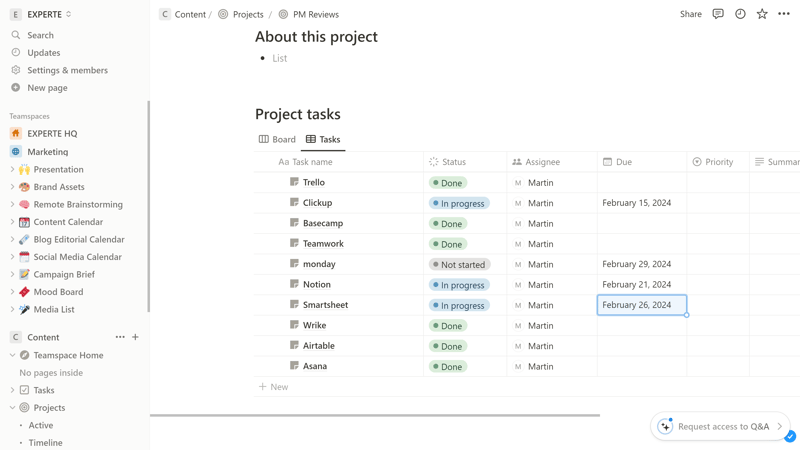
Notion is a wiki platform with project management features.
How Good Is Notion for Task Management?
Even though task management isn't Notion's focus, the platform excels at it. Users get everything needed for creating, directing, and flexibly visualizing projects and their tasks.
You can personalize your tasks with a wide variety of custom field types, categorize them with filters, and visualize them in many different ways thanks to the tool's extensive views. Subtasks and task dependencies are also supported.
Notion does well in terms of task management but offers much more.
What We Don't Like
Since task management is one of Notion's many capabilities, it's less streamlined than the other platforms we reviewed. While there are plenty of page design options, prep time and initiative are necessary for this to pay off.
If you're looking for an out-of-the-box task management tool that specializes in project visualization, fixed processes, and workflows, Notion might not be the best choice.
Trello: Best Kanban-Based Task Management Tool

Do the above solutions sound too complicated? If so, Trello* might be worth checking out: The straightforward Kanban tool has fewer features than its competitors but makes project and task management even simpler.
What We Like
Think of Trello as the opposite of ClickUp: Instead of offering as much as possible, Trello provides a few, excellently-designed features. Trello specializes in visualizing projects with Kanban boards.
The result is a user-friendly platform that can be quickly integrated into your daily routine. And it doesn't leave out beginners either.
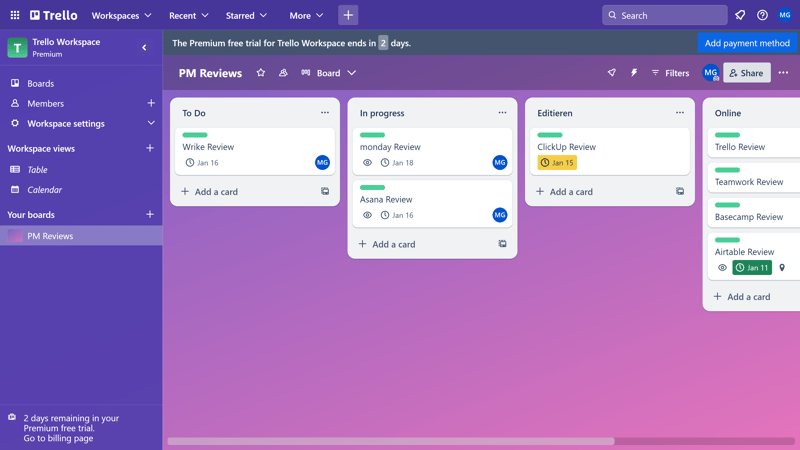
Trello concentrates primarily on the Kanban method.
How Good Is Trello for Task Management?
As long as you can live with Trello's limitations, you'll get a powerful task management tool. The platform is ideal for Kanban-style task management, in which tasks are organized into columns and sorted by status.
It's possible to edit the most important attributes for every task and visualize your projects with a few different views (Table, Calendar, and Cards). Trello isn't just a Kanban tool but does limit itself to the most important options and views.
What We Don't Like
Because of its emphasis on user-friendliness, the program offers less than its competitors, including some basic features. You won't get additional views, subtasks, or dependencies, and user-defined fields are limited to a few options.
Other Providers
There are plenty more project management platforms apart from our Top 5 that you can use to plan and execute your tasks. One of these tools might be more to your liking:
Teamwork.com

Teamwork.com* specializes in helping teams that work on client-based projects. This, along with its unique budgeting and invoicing features, makes it particularly appealing for agencies.
At the same time, if you're looking for a straightforward task management tool and don't need bells and whistles, Teamwork.com might be too complex and extensive.
Wrike

Wrike* is very similar to Asana and monday.com: The intuitive project management all-arounder includes most task management features. Unfortunately, there aren't many custom field types and time tracking and budgeting are reserved for higher-tier subscribers.
Airtable

Airtable* is a versatile spreadsheet/database/project management hybrid. This makes it an excellent choice for complex projects, to say nothing of its nearly unlimited customization options for tasks and entries.
Because of its emphasis on data and tables, Airtable is less process-oriented. Displaying tasks as parts of processes and project progress is also less intuitive.
Smartsheet

As you might have guessed, Smartsheet* is a data table platform for managing tasks and projects (but not only). This makes it an interesting choice for data-intensive projects, even though it's less process-oriented and intuitive.
Basecamp

Basecamp*, like Trello, keeps things simple to provide a focused and streamlined user experience. Instead of customization, Basecamp relies on fairly rigid project and task frameworks, which makes it easy to use.
The only downside is that this also limits flexibility and provides few opportunities to go beyond what's offered.
MeisterTask

MeisterTask* also opposes the complexity of other task management platforms The German tool is built around the Kanban method, and to a greater extent than Trello: Non-Kanban features and views are few and far between.
This makes it an ideal option for Kanban-based tasks, but little else.
Task Management: Comparing Providers
We've already discussed what a task management tool should be capable of doing, and which features are important. Below, we'll look at these in greater detail and let you know which platforms excel in each.
Custom Fields: Shape Your Tasks
Task management tools view each assignment or task as a record, the parameters of which can be adjusted. You can name it, describe it, assign it to a teammate, or specify a deadline.
Many parameters are included by default or can be added later on. The ability to add more custom fields to your tasks is important since it allows you to provide your team with important information or data.
In our reviews, we noted how many and which custom field types are included - the more, the better. Here's how our task management platforms stacked up in terms of custom fields:
| Airtable | monday | Notion | ClickUp | Wrike | Smartsheet | Asana | Teamwork | Trello | MeisterTask | Basecamp | |
|---|---|---|---|---|---|---|---|---|---|---|---|
| Text | ✓ | ✓ | ✓ | ✓ | ✓ | ✓ | ✓ | ✓ | ✓ | ✓ | ✗ |
| Number | ✓ | ✓ | ✓ | ✓ | ✓ | ✓ | ✓ | ✓ | ✓ | ✓ | ✗ |
| Single Select | ✓ | ✓ | ✓ | ✓ | ✓ | ✓ | ✓ | ✓ | ✓ | ✓ | ✗ |
| Gallery | ✓ | ✓ | ✓ | ✗ | ✓ | ✓ | ✓ | ✗ | ✗ | ✗ | ✗ |
| Checkbox | ✓ | ✓ | ✓ | ✓ | ✓ | ✓ | ✗ | ✓ | ✓ | ✗ | ✗ |
| Date | ✓ | ✓ | ✓ | ✓ | ✓ | ✓ | ✓ | ✓ | ✓ | ✗ | ✗ |
| Person | ✓ | ✓ | ✓ | ✓ | ✓ | ✓ | ✓ | ✗ | ✗ | ✗ | ✗ |
| Currency | ✓ | ✓ | ✓ | ✓ | ✓ | ✗ | ✓ | ✗ | ✗ | ✗ | ✗ |
| Percent | ✓ | ✓ | ✓ | ✗ | ✓ | ✗ | ✓ | ✗ | ✗ | ✗ | ✗ |
| Duration | ✓ | ✗ | ✗ | ✗ | ✓ | ✓ | ✗ | ✗ | ✗ | ✗ | ✗ |
| Progress | ✓ | ✓ | ✓ | ✓ | ✗ | ✗ | ✗ | ✓ | ✗ | ✗ | ✗ |
| Rating | ✓ | ✓ | ✗ | ✓ | ✗ | ✓ | ✗ | ✗ | ✗ | ✗ | ✗ |
| Files | ✓ | ✓ | ✓ | ✓ | ✗ | ✗ | ✗ | ✗ | ✗ | ✗ | ✗ |
| Date | ✗ | ✗ | ✗ | ✗ | ✗ | ✗ | ✗ | ✗ | ✗ | ✗ | ✗ |
| Relationships | ✓ | ✓ | ✓ | ✓ | ✗ | ✗ | ✗ | ✗ | ✗ | ✗ | ✗ |
| Rollup | ✓ | ✗ | ✓ | ✓ | ✗ | ✗ | ✗ | ✗ | ✗ | ✗ | ✗ |
| Total | 16 | 14 | 13 | 12 | 10 | 9 | 8 | 6 | 5 | 3 | 0 |
Views: Flexibility for Visualizations
Different views allow each teammate to visualize projects in a way that makes sense to them, boosting efficiency.
A Kanban board groups tasks into different columns, based on their progress, while a Calendar keeps deadlines in mind. Gantt charts are ideal for advanced planning and understanding dependencies between tasks. Tables offer a clear structure for data processing and analysis.
Good task management tools should offer as many views as possible and let users choose between them.
Here's how our task management platforms did in terms of views:
| ClickUp | Teamwork | monday | Asana | Airtable | Smartsheet | Notion | Wrike | Trello | Basecamp | MeisterTask | |
|---|---|---|---|---|---|---|---|---|---|---|---|
| List | ✓ | ✓ | ✗ | ✓ | ✓ | ✗ | ✓ | ✗ | ✗ | ✓ | ✗ |
| Table | ✓ | ✓ | ✓ | ✓ | ✓ | ✓ | ✓ | ✓ | ✓ | ✗ | ✗ |
| Kanban | ✓ | ✓ | ✓ | ✓ | ✓ | ✓ | ✓ | ✓ | ✓ | ✓ | ✓ |
| Gallery | ✗ | ✗ | ✗ | ✗ | ✓ | ✗ | ✓ | ✗ | ✗ | ✗ | ✗ |
| Calendar | ✓ | ✓ | ✓ | ✓ | ✓ | ✓ | ✓ | ✓ | ✓ | ✗ | ✗ |
| Timeline | ✓ | ✓ | ✓ | ✓ | ✓ | ✓ | ✓ | ✓ | ✓ | ✓ | ✓ |
| Gantt | ✓ | ✓ | ✓ | ✓ | ✓ | ✓ | ✓ | ✓ | ✗ | ✗ | ✗ |
| Mindmap | ✓ | ✗ | ✗ | ✗ | ✗ | ✗ | ✗ | ✗ | ✗ | ✗ | ✗ |
| Milestones | ✓ | ✓ | ✓ | ✓ | ✗ | ✓ | ✗ | ✗ | ✗ | ✗ | ✗ |
| Workload | ✓ | ✓ | ✓ | ✓ | ✗ | ✓ | ✗ | ✓ | ✗ | ✗ | ✗ |
| Map | ✓ | ✗ | ✓ | ✗ | ✓ | ✗ | ✗ | ✗ | ✓ | ✗ | ✗ |
| Total | 10 | 8 | 8 | 8 | 8 | 7 | 7 | 6 | 5 | 3 | 2 |
Advanced Features
Tasks can take many different forms: Sometimes, they're straightforward to-dos that can be completed one by one, other times, they're part of complex workflows and consist of multiple phases and steps.
A solid task management tool should be flexible and provide plenty of options for managing and contextualizing tasks.
We paid attention to these advanced task features:
| ClickUp | Asana | Wrike | Teamwork | Smartsheet | monday | Notion | Trello | MeisterTask | Airtable | Basecamp | |
|---|---|---|---|---|---|---|---|---|---|---|---|
| Custom Fields | ✓ | ✓ | ✓ | ✓ | ✓ | ✓ | ✓ | ✓ | ✓ | ✓ | ✗ |
| Subtasks | ✓ | ✓ | ✓ | ✓ | ✓ | ✓ | ✓ | ✓ | ✗ | ✗ | ✗ |
| Task Dependencies | ✓ | ✓ | ✓ | ✓ | ✓ | ✓ | ✓ | ✗ | ✓ | ✗ | ✗ |
| Milestones | ✓ | ✓ | ✓ | ✓ | ✓ | ✓ | ✗ | ✗ | ✗ | ✗ | ✗ |
| Goals | ✓ | ✓ | ✗ | ✗ | ✗ | ✗ | ✗ | ✗ | ✗ | ✗ | ✗ |
| Total | 5 | 5 | 4 | 4 | 4 | 4 | 3 | 2 | 2 | 1 | 0 |
Conclusion
A good task management platform can help your team focus on what's important: their assignments. Tools like ClickUp, Asana, or monday.com are great for structuring processes, coordinating work, and boosting efficiency.
Since your task management software will be used daily, choose carefully. For guidance in finding the best task management tool for your needs and budget, check out our comparison of the best project management solutions.
FAQs
Task management refers to the organization, prioritization, and monitoring of assignments, usually with specialized software. These tools can help to plan tasks, set deadlines, assign responsibilities, and monitor progress.
Task management helps teams and individuals to better structure their work, boost productivity, and achieve goals.
Task management deals with the coordination of individual assignments, regardless of whether they're part of a larger project or not.
On the other hand, project management oversees entire projects to complete them within a specific timeframe and budget. There is overlap, but task management isn't as extensive.
Deciding which task management software is best depends on your team's needs. ClickUp, our winner, has extensive configuration options; Asana is ideal for process-based workflows; and monday.com offers a user-friendly approach, even for complex projects, and helps visualize them.









